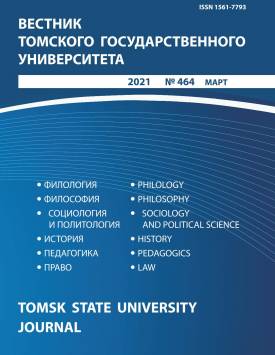The Cognitive-Ideological Matrix: A Diffusion Model of Dynamics
The problem of the dynamics of ideological processes as a scientific one can be posed in the following way: what are the patterns and trends in the development of ideological attitudes, and can they not form a protest potential in the youth environment? The aim of this work is the identification of regularities in the formation of ideological consciousness in youth and trends of their dynamics on empirical studies of the group consciousness of South Russia's students. The theoretical basis is M. Frieden's morphological approach to the study of ideologies and the author's concept of the cognitive-ideological matrix. In the development of the concept, the object of the research is the dynamics of ideological concepts, not their morphology (structure). The method of system-dynamic modeling, rarely applied by political scientists, was used to determine trends in ideological attitudes. The model of migration of ideological concepts is based on the Bass diffusion model and is implemented in the AnyLogic simulation system. Statistical data obtained during a survey of 2,500 students in the South of Russia were used as an empirical material necessary for launching the diffusion model. The sample of Rostov Oblast case was 816 respondents. The model of the migration of peripheral ideological concepts in the given period until 2022 reflects the dynamics of all ideological attitudes. In the case of the implementation of three main scenarios of the socioeconomic and political situation - negative, positive and neutral, changes are possible, which are described in terms of the “migration of peripheral ideological concepts”. In the case of a negative scenario, which implies a drastic deterioration of all the most important parameters: a high level of control over the Internet, economic instability, economic crisis, increasing social problems and the threat of military conflicts, with zero support for foreign policy, a left-conservative trend is expected. The situation is returning to the indicators of 2015, conservatives and national patriotic groups are regaining their leading positions, and there is an increase in left-wing radicalism. In the students' cognitive-ideological matrices, there is a change of peripheral concepts to nuclear ones. The danger of increasing supporters of right-wing radicalism is not noted. In the case of the implementation of positive and neutral scenarios, the status quo of 2019 is practically preserved, that is, the left-liberal trend prevails. It is established that the uncontrolled growth of either right- or left-wing ideological radicalism is not expected, political stability in the Southern region from this point of view is not threatened.
Keywords
cognitive-ideological matrix, ideology, ideological concept, attitudes, dynamics, political diffusion, system-dynamic modelAuthors
| Name | Organization | |
| Podshibyakina Tatyana A. | Southern Federal University | tan5@bk.ru |
| Konstantinov Mikhail S. | Southern Federal University | konstantinov@sfedu.ru |
| Vasileva Alisa A. | Southern Federal University | sknc_vasilyeva@mail.ru |
References

The Cognitive-Ideological Matrix: A Diffusion Model of Dynamics | Vestnik Tomskogo gosudarstvennogo universiteta – Tomsk State University Journal. 2021. № 464. DOI: 10.17223/15617793/464/11
